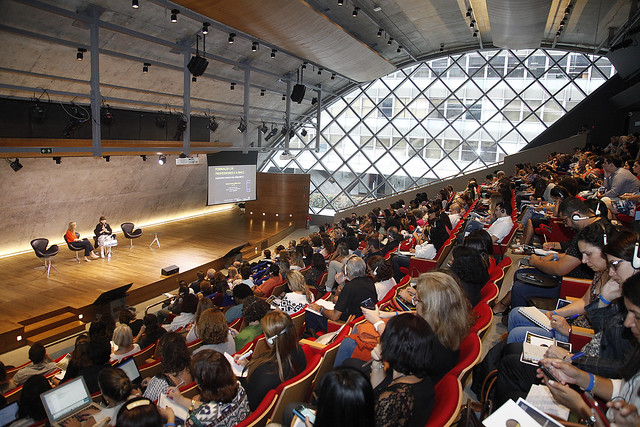Discussion about teacher training and education challenges in Brazil celebrates Columbia Global Centers | Rio de Janeiro’s 5th-Anniversary
Susan Fuhrman, President of Columbia University’s Teachers College, Claudia Costin, Former Director for Education at the World Bank, and Maria Helena Guimarães de Castro, Executive Secretary of the Ministry of Education (MEC), were main speakers during the event on March, 13.
Education is beyond teaching. For Columbia University it means to prepare students to be responsible members of diverse society. Given this, the theme was a natural choice to celebrate the 5th Anniversary of Columbia Global Centers | Rio de Janeiro held at Getulio Vargas Foundation (FGV) on March, 13.
Leading exponents from the Educational field participated and their stirring speeches about the curricula reform, teacher training, real challenges, and perspectives filled the full house with enthusiasm. The audience was composed mostly of teachers and professors, who felt heard and represented by the speakers.
Director Thomas Trebat welcomed the audience endorsing how important it is to discuss Education nowadays, especially in Brazil.
To start the afternoon-long event, Claudia Costin, Former Director for Education at the World Bank, interviewed guest of honor Susan Fuhrman, President of Teachers College. The brief interview served as an introduction to the following panels about pre-service teacher education, professional development for in-service teachers and the implementation of Brazil’s National Common Core (Base Nacional Comum Curricular -BNCC-, in Portuguese).
Moderated by Fábio Takahashi, Folha de São Paulo Journalist, the first panel focused on pre-service teacher education and the implementation of BNCC. The discussion featured Maria Helena Guimarães de Castro, Executive Secretary of the Ministry of Education, who didn’t spare critics to the current regulation of the teacher training education in Brazil, even though she’s on the public entity responsible for it. She acknowledged the fact that the regulation should be less bureaucratic and that the courses should value practical experience a lot more.
Still on that topic of valuing practical experience, Miguel Thompson, Executive Director of Singularities Institute, added to the matter that teachers need to be in contact with didactic material and tools that will be used in the classroom, instead of the extensive contact with philosophers’ thoughts they have during college. Both Thompson and Castro pointed out that studying the philosophers is important but it shouldn’t overshadow the practical experience.
Even though Paula Louzano, Dean of Diego Portales University in Chile, couldn’t be at the event, her participation via video sure enriched the discussion. Louzano, who’s Brazilian, stated that in order to successfully implement the BNCC, we need to make severe changes to the pre-service teacher education, and cited Chile as an example of effective public policies in the Education field.
Also, during the first panel, Fuhrman shared her experience with the American Common Core in New York, which served as a comparative and an example to be mindful of since the implementation wasn’t as successful as they hoped it would be.
After an enthused coffee break, the second panel was moderated by Camila Pereira, Director of the Lemann Foundation, and focused on professional development for in-service teachers. Costin pointed out that in-service education is beyond Master’s and Doctoral degrees and that teacher participation in the process of curriculum development and implementation is crucial. José Edmilson da Silva, Former Director of the Experimental Olympic Gymnasium (Ginásio Experimental Olímpico, in Portuguese), the first vocational school in Brazil, endorsed Costin’s point stating that collaborative work is essential, as well as making students realize their own strengths.
This relationship between students and teachers, which values strengths and collaboration, is important to create safe environments, Teachers College alumna Tonia Casarin affirmed. Casarin defends that emotions have a powerful impact on what we can learn and how we learn, and that’s why creating a safe environment where mistakes are allowed is fundamental. This way, both students and teachers will be able to learn from their mistakes, she says.
Composed of questions submitted by the audience through an online app, a third panel brought all the participants to the stage. Questions ranging from how to awake students to the profession of teaching to the impact of technology in education were featured during the Q&A.
To wrap up the event, Teachers College and the Lemann Foundation announced the extension of their partnership. The cooperation between them focuses on research (both on the implementation of the BNCC, and on teaching practice) and on the expansion of the scholarship program offered by the Lemann Foundation to Brazilian students, especially those who wish to study and do research on curriculum and teaching.
A cocktail to event attendees and guests closed the night of the Rio Center’s 5th-anniversary celebration. Under the leadership of Professor Thomas Trebat, the Rio Center has worked to improve the education and research environment in Brazil alongside its partners, including Columbia faculty. Throughout those five years, ongoing events, lectures, and seminars hosted by the Center have addressed the question many times and fostered the debate about a key theme, not only to Brazil but to the world, engaging civil society, academia, and governments. This strategic Center has been making a difference by facilitating several projects, info sessions, professional development courses, and fruitful partnerships since its launch in March 2013.
